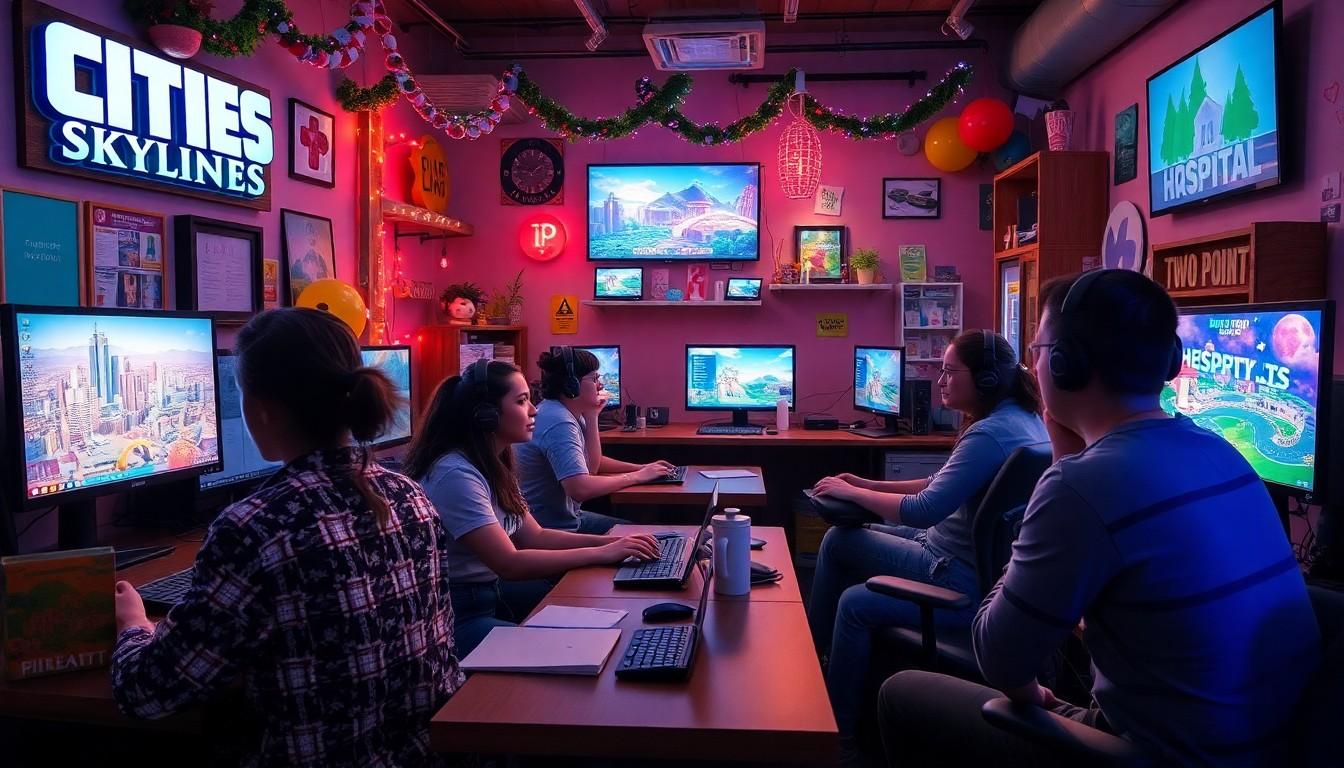In 2019, simulation games took players on wild rides through everything from managing a bustling city to piloting a spaceship. These games aren’t just about numbers and pixels; they’re about crafting experiences that let players step into the shoes of their wildest dreams. If you’ve ever wanted to run a farm, build a rollercoaster, or even survive a zombie apocalypse without the actual danger, simulation games are your ticket to blissful escapism.
Overview of Simulation Games
Simulation games stand out for their capacity to create immersive environments. Players engage in diverse activities, from city management to space exploration. Each game presents unique scenarios, enabling players to experience life situations they may never encounter.
Various genres encompass simulation games, including social simulations, life simulations, and construction simulations. Within social simulations, players interact within a dynamic environment, guiding the lives of characters. Life simulations often focus on building relationships, managing resources, and personal growth.
Development teams invest considerable time crafting intricate worlds. Detailed graphics enhance players’ sensations of realism. The game mechanics allow for complex engagement, where decision-making significantly impacts outcomes.
In 2019, the expansion of virtual reality technology further enriched simulation gaming. Players gained the opportunity to experience virtual environments in an unprecedented manner. Virtual landscapes provided immersive play where actions translated into realistic experiences.
Multiplayer options increased social interaction. Players collaborated or competed with others from across the globe. Gamers found community, shared experiences, and participated in collective challenges.
Simulation games also emphasize customization. Players tailor their experiences, from designing characters to shaping entire worlds. Options for personalization enhance investment, making the gaming experience feel uniquely one’s own.
With ongoing innovations in gameplay mechanics and technology, the appeal of simulation games continues to grow. Enthusiasts appreciate the depth of gameplay and the opportunities to explore new realms. They offer a blend of entertainment and exploration, proving their enduring popularity in the gaming landscape.
Top Simulation Games of 2019

Simulation games captivated players in 2019 with their immersive environments and diverse scenarios. Here are some of the top titles that defined the genre that year.
Game 1: Features and Highlights
Cities: Skylines stood out for its intricate city-building mechanics. Players could design urban landscapes, manage resources, and tackle challenges like traffic congestion. With a robust modding community, users enjoyed constant updates and enhancements. The detailed simulation of city life created engaging experiences. Each decision impacted growth, making strategic planning crucial for success.
Game 2: Features and Highlights
Planet Coaster captured the essence of theme park management. Players designed thrilling roller coasters, managed finances, and ensured customer satisfaction. An extensive customization system allowed for creativity in park layout and attractions. Engaging tutorials guided new players, while seasoned veterans appreciated the depth of mechanics. The game’s vibrant graphics added to its appeal, immersing players in their park’s atmosphere.
Game 3: Features and Highlights
Two Point Hospital reimagined hospital management with humor and charm. Players constructed hospitals and created amusing medical conditions, leading to a lighthearted experience. Engaging gameplay required balancing budgets, improving patient care, and expanding facilities. The quirky art style set it apart visually, enhancing the overall enjoyment. Players found satisfaction in solving unique challenges while managing their hospitals effectively.
Genres of Simulation Games
Simulation games encompass various genres that immerse players in unique experiences. These genres facilitate exploration of different activities, appealing to a wide audience.
Life Simulation
Life simulation games replicate everyday scenarios, allowing players to control characters in virtual environments. Popular titles like “The Sims” encourage creativity in character design and home building. Players engage in activities ranging from social interactions to career development, fostering connection with their virtual lives. This genre emphasizes storytelling and personal experiences, making gameplay feel relatable and engaging.
Construction and Management
Construction and management simulation games focus on resource allocation and strategic planning. In games such as “Cities: Skylines,” players design urban landscapes while managing utilities, transportation, and population needs. Each decision impacts the city’s growth and efficiency, creating a complex web of interactions. Players balance aesthetics and functionality, enhancing their problem-solving skills in the process. The genre’s depth offers both challenges and rewards, appealing to a strategic audience.
Vehicle Simulation
Vehicle simulation games provide realistic driving or flying experiences. Titles like “Microsoft Flight Simulator” deliver immersive environments with detailed landscapes and weather conditions. Players navigate aircraft or vehicles, often replicating real-world physics and controls. This genre caters to enthusiasts who appreciate realism and technical mastery. Engaging in these simulations fosters skill development and offers an authentic taste of vehicle operation, capturing the attention of players globally.
How to Choose the Best Simulation Game
Choosing the right simulation game hinges on personal preferences and gameplay mechanics. Focus on elements that resonate with individual interests and expectations.
Consider Your Interests
Evaluate the type of scenarios that excite gameplay. City management games appeal to those who enjoy strategic planning. Life simulation games attract players interested in character interactions and creativity. Vehicle simulation titles cater to enthusiasts of realistic driving and flying experiences. Identifying preferences enhances the gaming experience and fosters engagement.
Check for Gameplay Depth
Analyze the mechanics and features that drive engagement. Look for games that offer rich experiences, allowing players to explore various systems. Deep gameplay can include complex resource management or intricate character development. Test the game’s difficulty, ensuring it provides challenging yet rewarding interactions. This layer of depth keeps players invested in their virtual journeys.
Conclusion
Simulation games in 2019 have proven to be a powerful medium for creativity and engagement. They allow players to step into diverse roles and explore intricate worlds that reflect their interests and fantasies. With advancements in technology and gameplay mechanics these games continue to captivate audiences by offering rich experiences that cater to various preferences.
The blend of immersive environments customization options and social interactions enhances the overall appeal of simulation games. As developers push the boundaries of what’s possible players can expect even more innovative experiences in the future. The rise of simulation gaming solidifies its place as a beloved genre that encourages exploration and personal expression.

